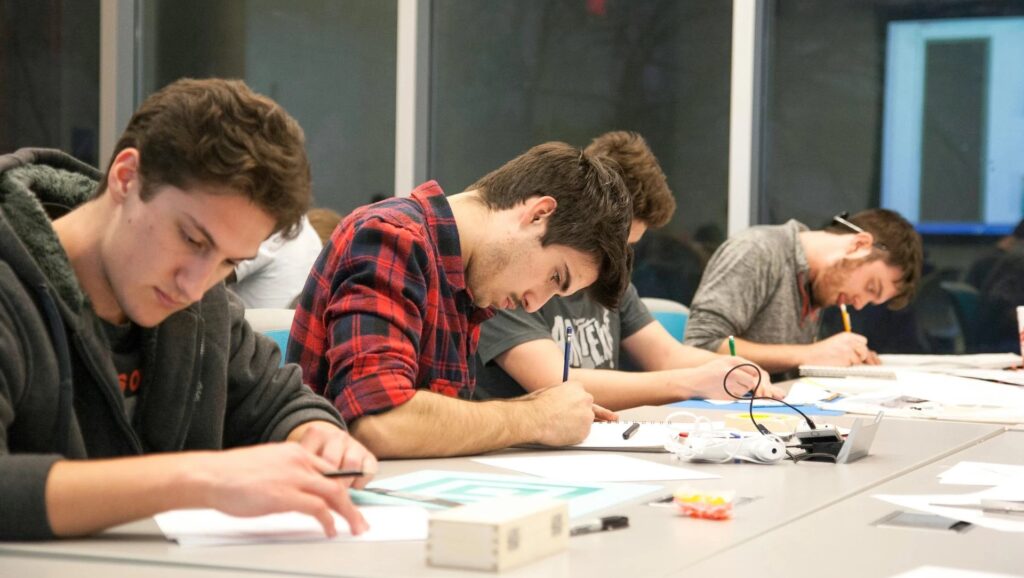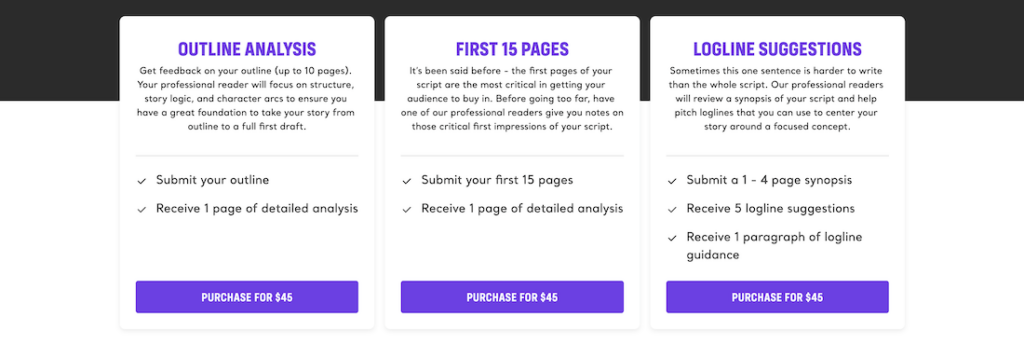I don’t like beginnings. Or rather, I don’t like being a beginner, even when I’m trying something for the first time. A limiting outlook, I know. But my start in screenwriting almost let me get away with this. My first feature script was accepted into the Sundance Lab where I got to workshop it with Lee Isaac Chung. It was produced by Forest Whitaker and Endeavor Content. And I was continually told on and off set, “Are you ready for your career to take off?”
But the buzz never materialized. Nobody asked. Nobody called. In the silence, my mind wandered. Why aren’t people taking me more seriously? Do people think I’m a fluke? And the inevitable—do I not belong?
The Expected and the Unexpected
My background doesn’t exactly scream “writer.” I was born in Chicago and raised in New Jersey, but I grew up on tennis courts. I always loved movies, but as the only Asian kid in my class, a career in the arts felt a step too far outside my self-perceived box. For undergrad, I not only followed my sister to NYU but also the family vocation, medicine. I snuck in a few student films where I could, but the only real stage time I got was as a Biochemistry teaching assistant giving a weekly review lecture.
But half a year before starting medical school at Johns Hopkins, my father, a doctor himself, left our family. I was never close to my father (and I haven’t spoken to him since he left), but I had always clung to a certain ideal of him. One closer to the epitome of a doctor—intelligent, honest, selfless. There was never a hint of this man full of regret, resentful against his family for the life he felt was forced on him.
It was disorienting, but the saga also catalyzed a more honest conversation with myself about who I was and what I wanted. So I started medical school—consciously curious about the forces that guide our lives, subconsciously terrified of becoming my father.

Johns Hopkins
When You Get What You Want
Closer to the actual day-to-day mechanics of medicine, I felt underwhelmed. Whenever I was in the hospital, I found myself counting down the minutes to when I could leave. It became clear I had been pursuing an identity more than fulfilling a passion for diagnosis and treatment.
I spent the summer after my first year talking to professionals in other industries—consulting, law, academia, etc. They all mentioned how these careers offered stability and status. But so did medicine.
Needing a break from my mind, I dove back into watching movies and TV. But I found my love for them had morphed into something different, something uglier: jealousy.
Read More: The Ultimate Inspirational Video for All Screenwriters
Frontiers Are Where You Find Them
Then, early in my second year, one classmate told me how gutted she felt after reading the play Death of a Salesman. Hoping to impress her, I read the play the next night and wrote her a letter with my analysis—of why we yearn to be seen by our parents, even if it’s as a lesser version of ourselves. She never wrote back.
But a few weeks later, she told me about a table reading a theater director was holding for the first year on a play written by a doctor. I jumped at the opportunity. In a small room in our medical school, I found myself lost in the world of the protagonist, processing dormant emotions of disconnection and shame. For the first time in a long time, instinct mattered more than reason.
Before I could overthink it, I took one theater class and one screenwriting class at the undergrad campus. That early writing, I assure you, showed no indication of any future in this business. But my obsessive side was awakened. I even studied for my board exam in New York just so I could take a Shakespeare theater class in the basement of a bookstore across from Port Authority.
No Risk, No Story
Entering third-year rotations, storytelling dominated my headspace. I’d spend rare days off writing scenes, performing in an improv troupe, or daydreaming ideas (this happened in the hospital, too). I didn’t dare to tell my family about my newfound passion, but I did have the resolve to bet on my neuroticism and my dream. So, in my final year, I decided not to apply for residency and move to Los Angeles after graduation.
I worked full-time at a healthcare company on the business side to pay the bills and mitigate family concerns. But it was always a cover. The real focus was the Hollywood dream. I spent my nights and weekends in classes or acting/writing short films.
But there was always the one big idea, one that developed back in my final year of medical school. A psychological thriller about a Korean-American immigrant obsessed with becoming the top transplant surgeon—write what you know, right? This would be my Good Will Hunting. After strong feedback on the short film script, I quit my job and wrote the feature. I applied to the Sundance Lab a month later.
Back Against the Wall
If my first feature was written in a starry-eyed, chase-your-dream haze, my second feature was born out of anger. Production wrapped on the first feature, and several things did not go as planned or promised. Another story for another time. So back home in Jersey for the holidays, I finished the first draft of my second feature in nine days. The script, I Hold It True, centers around an immigrant son on trial for a murder he doesn’t remember and utilizes an underground memory technology to reconstruct the events in question.
I was sure the high-concept premise would bring me my long-overdue adulation. The plan was simple—apply to the top screenwriting competitions, win all of them, and reject all those I felt rejected by. I’ve never been short of confidence. Blame a childhood spent on tennis asphalt.

‘King Richard’ (2021)
Make the Writing Personal, Not the Business
But an unexpected pattern emerged. The memory technology and nonlinear plot structure grabbed people’s attention but didn’t keep anyone reading. Readers wanted more of the family dynamic. To lean into this immigrant family attempting to not only change their future trajectory but also to rewrite their past in a land where nobody knows them. The personal part of all of this.
ScreenCraft was the only genre-specific competition I applied to—and it stood out for this reason. Where other competitors got bogged down in the minutia of science, ScreenCraft’s readers grasped the grounded nature of this sci-fi world right away. Their comfort with the genre allowed them to focus on the actual story elements.
Read More: 5 Takeaways from ‘Making and Selling Great Sci-Fi & Fantasy’
After placing as a finalist, I met with ScreenCraft staff member Donnita Shaw for a conversation on the business side of things. She helped me see how I could have navigated myself better during my first feature—to own my narrative, be shameless in reaching out (don’t wait for people to come to you), and advocate for your vision.
New managers and agents reached out. But the placement also made it easier to get the ear of existing contacts. It seems every project needs its stamp of approval. It never stops.
Stay Tuned
Now, my focus is on creating “near-fi” stories—sci-fi grounded in scientific plausibility. A reflection of my journey, where science meets story.
And before I sign off, a shout out to the feature film Where In The Hell by Laramie Denis, an arthouse road trip comedy film. I played one of the leads, Alan, an aspiring actor hellbent on becoming a movie star even though the world is falling apart. I’ve never felt so free in front of the camera than with Denis behind it. It’s out to festivals now, premiere TBD! Keep track at Where In The Hell‘s official website.
Read More: The Craft and Rules of Worldbuilding in Science Fiction & Fantasy
CHECK OUT OUR PREPARATION NOTES SO YOU START YOUR STORY OFF ON THE RIGHT TRACK!
I’m a Korean-American doctor turned actor/writer from New Jersey. After an adolescence spent as a nationally ranked USTA tennis player, I graduated magna cum laude from NYU as a pre-med. I then spent a year in Honduras researching the dengue virus through a Fulbright Scholarship. I went on to receive an M.D. from Johns Hopkins while exploring my passion for storytelling.
My first feature, Transplant, was selected as part of the Sundance Screenwriters Intensive and was produced by Forest Whitaker and Endeavor Content. My second feature, I Hold It True, placed as one of 25 finalists out of 1500 entrants in the ScreenCraft Sci-Fi Competition. I’ve worked as the principal actor in multiple national commercials and the lead actor in an upcoming feature film by Laramie Dennis. I teach the MCAT to keep up my scientific foundation. My goal is to build a production company that creates stories based on science and medicine.
The post How ScreenCraft Sci-Fi Competition Winner Is Navigating the Future of His Screenwriting Career appeared first on ScreenCraft.
Go to Source
Author: Joohun Lee






